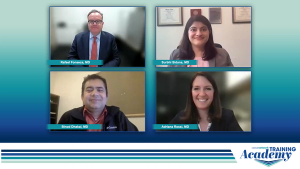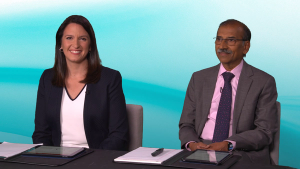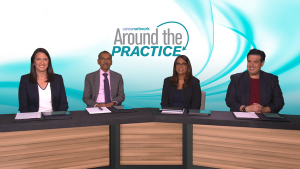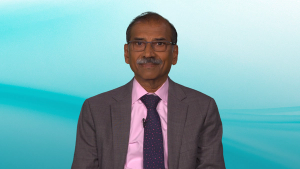Articles by Adriana C. Rossi, MD

Panelists discuss how patients relapsing shortly after BCMA CAR T-cell therapy should receive GPRC5D-targeted bispecifics rather than repeat BCMA therapies, given the evidence that prior BCMA exposure reduces efficacy of subsequent BCMA-directed treatments.

Panelists discuss how a triple class–exposed patient with comorbidities like COPD represents an ideal candidate for BCMA-directed bispecific therapy over CAR T-cell therapy due to the ability to titrate dosing and manage respiratory infection risks.

Panelists discuss how community practices need clear protocols for after-hours fever management, adequate caregiver support assessment, and standardized algorithms for cytokine release syndrome treatment across multiple bispecific products.

Panelists discuss how step-up dosing has successfully transitioned from inpatient-only to hybrid and outpatient models using prophylactic tocilizumab and standardized protocols for managing cytokine release syndrome.

Panelists discuss how talquetamab’s unique skin and taste toxicities are manageable through dose modifications and supportive care, with IVIG prophylaxis being crucial for BCMA-targeted but not necessarily GPRC5D-targeted therapies.

Panelists discuss how real-world data consistently show bispecific efficacy matching clinical trial results despite treating higher-risk patients, and how prophylactic interventions have reduced cytokine release syndrome severity.

Panelists discuss how CAR T-cell therapy should generally precede bispecifics when possible due to T-cell exhaustion concerns, though they agree there are virtually no absolute contraindications to bispecific therapy.

Panelists discuss how bispecifics are reversing the historical paradigm of diminishing returns in relapsed/refractory multiple myeloma, achieving 60% to 70% response rates lasting over a year in heavily pretreated patients.

Panelists discuss how patient preferences for treatment-free intervals are increasingly important in therapy selection, with bispecifics offering potential for response-adapted dosing and early discontinuation while maintaining remissions.
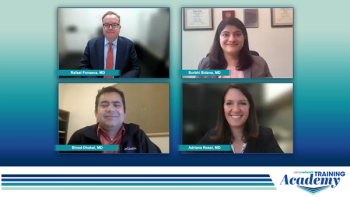
The panel concludes the discussion by offering future perspectives on the evolving treatment landscape in multiple myeloma, highlighting exciting developments and ongoing research.

Continuing discussion centered on a patient case, the panel discusses bispecific antibody combinations and the role of BCMA-targeting CAR T-cell therapies in relapsed/refractory multiple myeloma.

Adriana Rossi, MD, presents the case of a 60-year-old patient with stage III kappa light chain multiple myeloma, and members of the panel provide their initial impressions.

The panel discusses the utilization of CAR T-cell therapy for patients with multiple myeloma, highlighting treatment selection, sequencing, and insurance considerations.

Binod Dhakal, MD, presents the case of a 66-year-old patient with IgG kappa multiple myeloma, and the panel discusses treatment considerations and decisions.
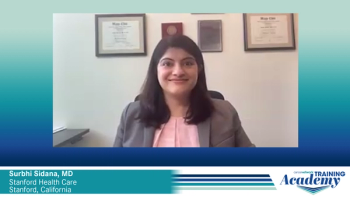
Surbhi Sidana, MD, provides clinical insights on treatment sequencing strategies for patients with relapsed/refractory multiple myeloma.

Myeloma specialists discuss clinical trials investigating CAR T-cell therapies in patients with relapsed/refractory disease.

The panel discusses recent updates on bispecific antibodies for patients with relapsed/refractory multiple myeloma, highlighting studies investigating talquetamab, teclistamab, and elranatamab.

A panel of experts on multiple myeloma introduce themselves and discuss recent CAR T-cell therapy approvals in earlier treatment lines for patients with relapsed/refractory disease.
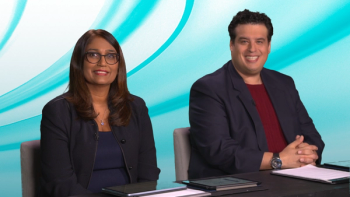
Before closing out their review on the management of multiple myeloma, panelists consider disparities in care and share how these barriers are being addressed.
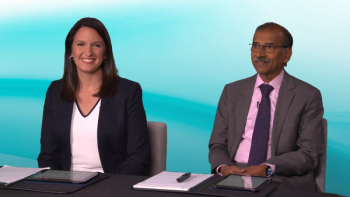
A comprehensive review of novel therapy being investigated in the setting of relapsed/refractory multiple myeloma to expand the bispecific antibody and CAR T-cell therapy armamentarium.
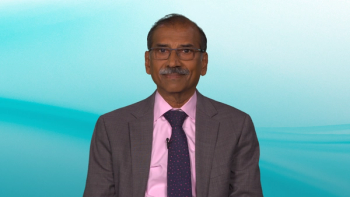
Shared insight on key factors that determine the best selection of therapy in patients with relapsed/refractory multiple myeloma, with a focus on bispecific antibodies and CAR T-cell therapy.
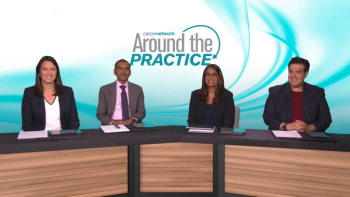
After reviewing their third patient case, expert hematologist-oncologists highlight the treatment armamentarium for relapsed/refractory multiple myeloma.

Before closing out their module on transplant-ineligible newly diagnosed multiple myeloma, panelists reflect on best treatment practices in the setting of high-risk disease.

Practical perspectives on the optimal selection of therapy for transplant-ineligible NDMM, followed by considerations for duration of therapy and dosing.

Expert perspectives on cornerstone induction therapy regimens used in patients with transplant-ineligible newly diagnosed multiple myeloma.

Switching their attention to the transplant-ineligible setting of newly diagnosed multiple myeloma, panelists center discussion around their second patient case.

Expert hematologist-oncologists consider the role of maintenance and consolidation following the completion of transplant in patients with newly diagnosed multiple myeloma.

A brief review of the role of transplant in patients with newly diagnosed multiple myeloma and how it can be best coupled with systemic treatment.

Comprehensive insight on mainstay induction therapy options for patients with transplant-eligible newly diagnosed multiple myeloma in the context of recent clinical studies.

Opening their discussion on the first patient case, expert panelists review the management of transplant-eligible newly diagnosed multiple myeloma.









